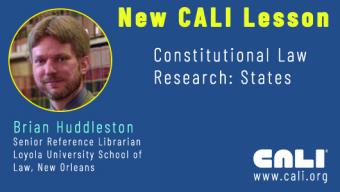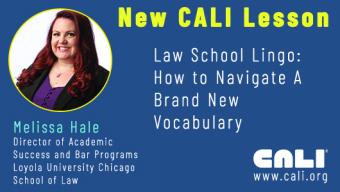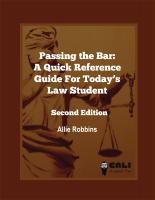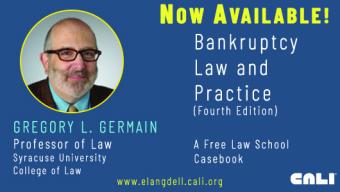Teaching Bankruptcy Law? Check out the new 4th Edition casebook entitled "Bankruptcy Law & Practice" by Prof. Germain. Creative Commons licensed. Peer-reviewed. 100% Free.
DESCRIPTION
This is the fourth edition of Bankruptcy Law and Practice, a Casebook Designed to Train Lawyers for the Practice of Bankruptcy Law. It is designed for a one-semester course in debtor/creditor law and bankruptcy. The book deals with both creditor remedies and debtor protections, starting with state law collection remedies, exemptions, and the important special protections for secured creditors under both Article 9 of the Uniform Commercial Code and state real property recording acts. After a thorough review of state law debt collection practice, the book covers the basics of straight bankruptcy law with a focus on Chapter 7 of the Bankruptcy Code, both for individuals and businesses. Although the book has a practice focus, it covers the major Supreme Court cases, and important appellate cases with an emphasis on areas of uncertainty. The book also emphasizes the Bankruptcy Code itself, using problem sets to get students to work through the language of the Bankruptcy Code.
At the end of the book are two abbreviated chapters on bankruptcy reorganizations for consumers under Chapter 13 and for businesses under Chapter 11. These chapters are intended to outline the reasons that debtors choose to file for reorganization rather than liquidation, and focuses on the rules for confirming a plan.
The primary goal of the book is to prepare students for the practice of bankruptcy law. Students who understand these materials should be well prepared to anticipate and address the kinds of issues that arise in real bankruptcy cases, whether in a small dollar consumer practice or a big dollar corporate reorganization. Students will learn the language of commercial law and bankruptcy, along with the skills to find their way around the Bankruptcy Code.
Also available to students, as a separate document under eBook Downloads, is the Bankruptcy Code and Selected Provisions of Federal Law.
Casebook: 319,629 Words, 622 Pages in PDF (including appendix materials)
Bankruptcy Code and Selected Provisions of Federal Law: 328 Pages in PDF





